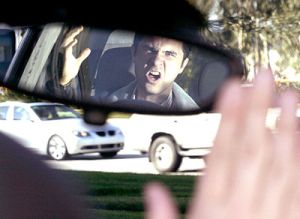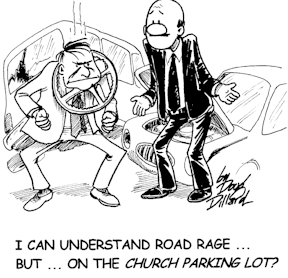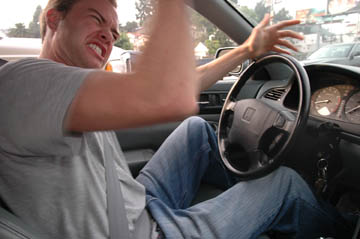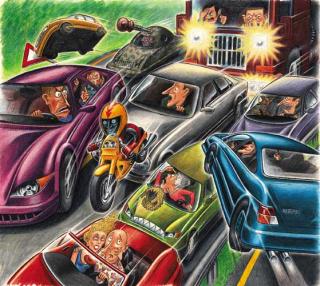|
|
|||||||||||||||||||||||||||||||
|
Road Rage - Feeling Violent Behind the Wheel
Feeling Violent Behind the Wheel
Four out of five motorists feel road rage while driving Road rage makes four out of five drivers a danger on the roads, according to a leading safety campaign. A national survey by the charity Brake found almost 80% of drivers admitted continuing to drive while stressed out by other drivers, work or personal problems. And up to a third said their concentration was affected at least once a week. The study, carried out in partnership with recovery group Green Flag, questioned more than 1000 drivers across the UK.
And up to three quarters of them said personal problems were the most likely source of that stress. Jools Townsend, head of education at Brake, said: "Driving is the most dangerous activity most of us do on a daily basis, and requires complete concentration. "Driving while distracted by worries or frustrations can lead to fatal errors, or even dangerous, aggressive driving."
Road rage affects millions There's an epidemic running through Great Britain and it is infecting 80 per cent of the motoring population. The disease has been around for some time but, in today's world of increased travel and better links between different parts of the country, it is spreading faster than ever before. We are of course talking about road rage. According to research from road safety charity Brake and breakdown specialist Green Flag, a third of us are affected by road rage every week. In addition to the high numbers of sufferers, the survey found that 63 per cent of us are driving around while stressed, increasing the chances of road rage and accidents. "Driving is the most dangerous activity most of us do on a daily basis, and requires complete concentration," said Jools Townsend from Brake. "The demands of modern life often lead to stress and frustrations - and research shows that many of us succumb to stress on a regular basis. "We need to see drivers taking responsibility for their own safety and that of others, and not allowing themselves to drive if they're not fully calm and focused," he added. According to the research, most of us (95 per cent) agree that it is important to keep calm and focussed while driving, however 74 per cent of us are regularly thinking about something else while behind the wheel.
Cool head best response to road rage
How many of us have been there and done that? A speeding car ignores a stop sign and pulls in front of us so we have to hit the brakes. We honk the horn and flash the headlights. A car cuts us off, and we wave our fist – or a less polite appendage - at the driver. Or maybe the steering wheel has been on the other foot. We make a misjudgment and somebody makes a rude remark, and we say something just as rude back. In each of these scenarios, there are elements of road rage – a potentially lethal response. When anger takes over behind the wheel, anything can happen. With our roads getting increasingly jammed, the number of reports of road rage is likewise increasing. Why do normally rational people get so angry at someone else's driving? If we sideline the not overly-credible theory that road rage is a newly-diagnosed form of mental disorder, there are two other dynamics to consider. One possible root of road rage is embedded in territorialism, according to Web site mentalhealth.about.com. If someone has space we want, such as a car creeping along at 30 mph in a 45 mph zone and holding us back, or another car cuts into our space, our primitive response to having our space invaded can rise up. Another possible reason people will do things behind the wheel they would never do face-to-face is that a car acts as a shield of anonymity, according to the Web site. It's something like wearing a costume at Halloween. If nobody knows who we are, out-of-character behavior is more likely to occur. There is a third reason why road rage can crop up. There may be a stressed out personality behind the wheel.
Recently a road rage incident happened in Braintree. In this case, the alleged road rage person vented his impatience on a Weymouth driver who he thought was going too slow and reportedly backed his rage with a gun. Here the victim was the object of road rage. He, or perhaps a bystander, did the wise thing and involved the police. But just imagine if a driver expressed road rage to this guy with the gun. The lesson: you never know who's in the other car. The best gesture you can make if you witness or are involved in a road rage incident is to pick up your cell phone and call the police. Avoid eye contact and get out of the way, mentalhealth.about.com advises. You don't want to respond in anger to some guy who cut you off who may be armed. Keep a cool head behind the wheel.
|
|
||||||||||||||||||||||||||||||
|
Website Design + SEO by designSEO.ca ~ Owned + Edited by Suzanne MacNevin | |||||||||||||||||||||||||||||||




